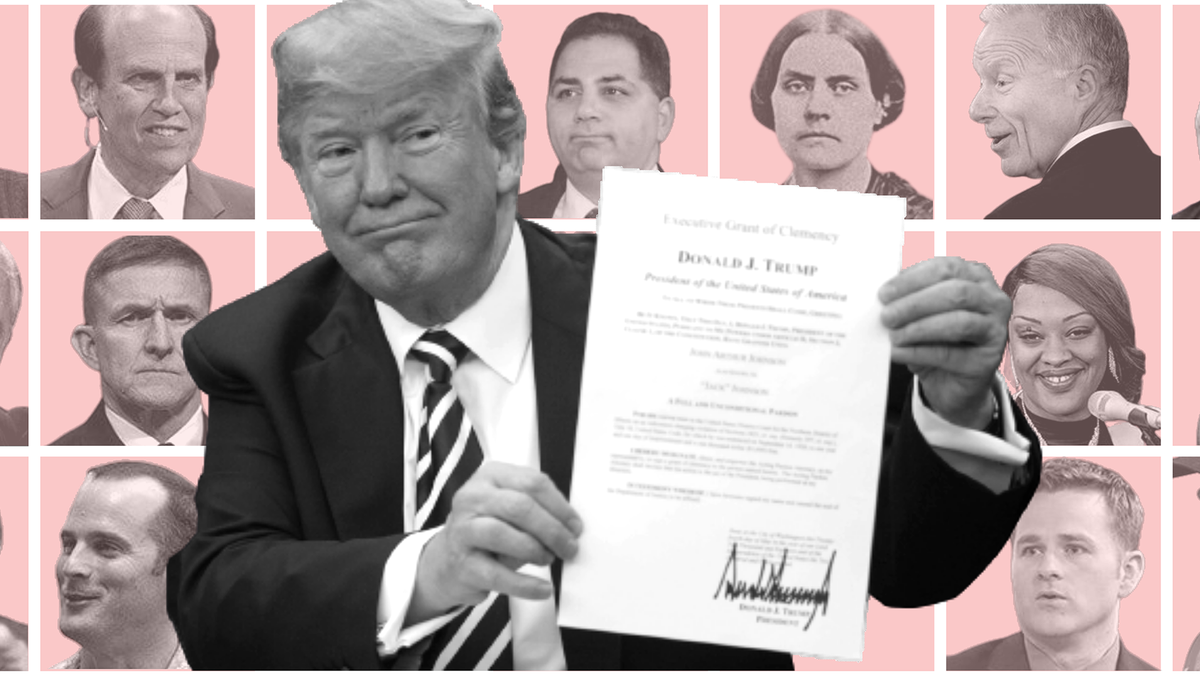Trump's Second Term Pardons: A Case Study In Executive Power

Table of Contents
Presidential pardon power, enshrined in Article II, Section 2 of the U.S. Constitution, allows the President to grant reprieves and pardons for offenses against the United States. This power, rooted in the British monarch's prerogative of mercy, has a long and often contentious history in American politics. Historically, pardons have been used for reasons ranging from genuine remorse and rehabilitation to overtly political motivations. This article will explore the potential scenarios surrounding a hypothetical second Trump administration and its potential use of this powerful tool.
2.1 Legal Authority and Limitations of Presidential Pardons
The constitutional grant of pardon power is broad, stating simply that the President "shall have Power to grant Reprieves and Pardons for Offenses against the United States, except in Cases of Impeachment." This seemingly unlimited power, however, is subject to several key limitations. Firstly, pardons cannot be issued for future crimes; they are reactive, not preventative. Secondly, pardons in cases of impeachment are explicitly excluded, leaving the impeached individual vulnerable to the legal ramifications of their actions.
Relevant Supreme Court cases, such as Ex parte Garland (1866) and Murphy v. Ford (1975), have further shaped the understanding of presidential pardon power, clarifying its scope and limitations. These rulings have largely upheld the President's broad discretion, while also acknowledging the constraints imposed by the Constitution and established legal principles.
- Controversial Pardons and Legal Challenges:
- Ford's pardon of Nixon: While legally sound, the pardon sparked intense public debate, raising questions about its timing and motivations.
- Trump's pre-election pardons: These actions, including those granted to individuals convicted of crimes related to the Mueller investigation, intensified the ongoing discussion of political motivations in the use of pardon power.
2.2 Political Motivations Behind Potential Pardons
A second Trump term would likely witness a continuation, perhaps even an intensification, of the politically charged use of presidential pardons. Motivations could include:
- Rewarding Loyalty: Pardons could be granted to allies who have faced legal challenges or accusations.
- Strengthening Political Alliances: Pardons might be strategically employed to build support within specific political factions or to influence future elections.
- Reversal of Previous Convictions: Individuals convicted under previous administrations might be targeted for pardons, further solidifying a narrative of political retribution.
The impact on future elections and the political landscape could be significant. Such actions could rally support among a specific base but alienate others, creating a deeply divided electorate.
- Potential Pardon Recipients and Implications:
- Individuals convicted in relation to the January 6th Capitol riot: Pardoning individuals involved could further polarize the nation and weaken faith in the rule of law.
- Individuals convicted of financial crimes: Pardoning individuals with close ties to the Trump administration might be viewed as an act of self-preservation and avoidance of accountability.
2.3 Impact on Public Trust and the Rule of Law
The use of presidential pardon power for overtly political reasons undermines public trust in the fairness and impartiality of the justice system. When pardons appear to be driven by partisan loyalties or personal gain, rather than principles of justice and mercy, it erodes confidence in the evenhanded application of the law. This can lead to a sense of injustice and increased cynicism towards government institutions.
- Consequences of Perceived Abuse of Pardon Power:
- Decreased public confidence in the presidency and the executive branch.
- Increased polarization and societal division.
- Potential for civil unrest and social instability.
2.4 Comparison with Past Presidential Pardon Practices
Comparing potential Trump pardons with those of past presidents offers valuable historical context. While all presidents have exercised pardon power, the frequency, nature, and political context vary significantly. For example, Gerald Ford's pardon of Richard Nixon was highly controversial, whereas other presidents have used pardons more sparingly and with less visible political motivations. Analyzing this historical precedent illuminates the potential consequences of a heavily politicized approach to executive clemency.
- Examples of Controversial Presidential Pardons:
- Andrew Johnson's controversial pardons following the Civil War.
- The numerous pardons granted by presidents during periods of political upheaval or national crisis.
Conclusion: Understanding the Implications of Trump's Second Term Pardons
The potential use of presidential pardon power in a second Trump term raises significant questions about the intersection of law, politics, and public trust. A heavy reliance on pardons for political gain can severely damage the integrity of the justice system and erode public confidence in government institutions. Understanding the legal limitations and potential political motivations behind these actions is crucial for analyzing their impact on American democracy. Further research into presidential pardon power, executive clemency, and Trump's pardons is essential to engaging with this critical aspect of American governance. We encourage you to explore resources like the Congressional Research Service reports and academic journals to deepen your understanding of this complex issue and its ramifications for the future of American democracy.

Featured Posts
-
 Celtics Vs Cavaliers Predicting The Outcome Of The Crucial Matchup
May 15, 2025
Celtics Vs Cavaliers Predicting The Outcome Of The Crucial Matchup
May 15, 2025 -
 The Importance Of Middle Managers Benefits For Employees And Organizations
May 15, 2025
The Importance Of Middle Managers Benefits For Employees And Organizations
May 15, 2025 -
 San Diego Padres Vs Los Angeles Dodgers A Battle Of Strategies
May 15, 2025
San Diego Padres Vs Los Angeles Dodgers A Battle Of Strategies
May 15, 2025 -
 Elon Musks Alleged Paternity Of Amber Heards Twins Separating Fact From Fiction
May 15, 2025
Elon Musks Alleged Paternity Of Amber Heards Twins Separating Fact From Fiction
May 15, 2025 -
 Butlers Big Game Golden State Warriors Defeat Houston Rockets
May 15, 2025
Butlers Big Game Golden State Warriors Defeat Houston Rockets
May 15, 2025
